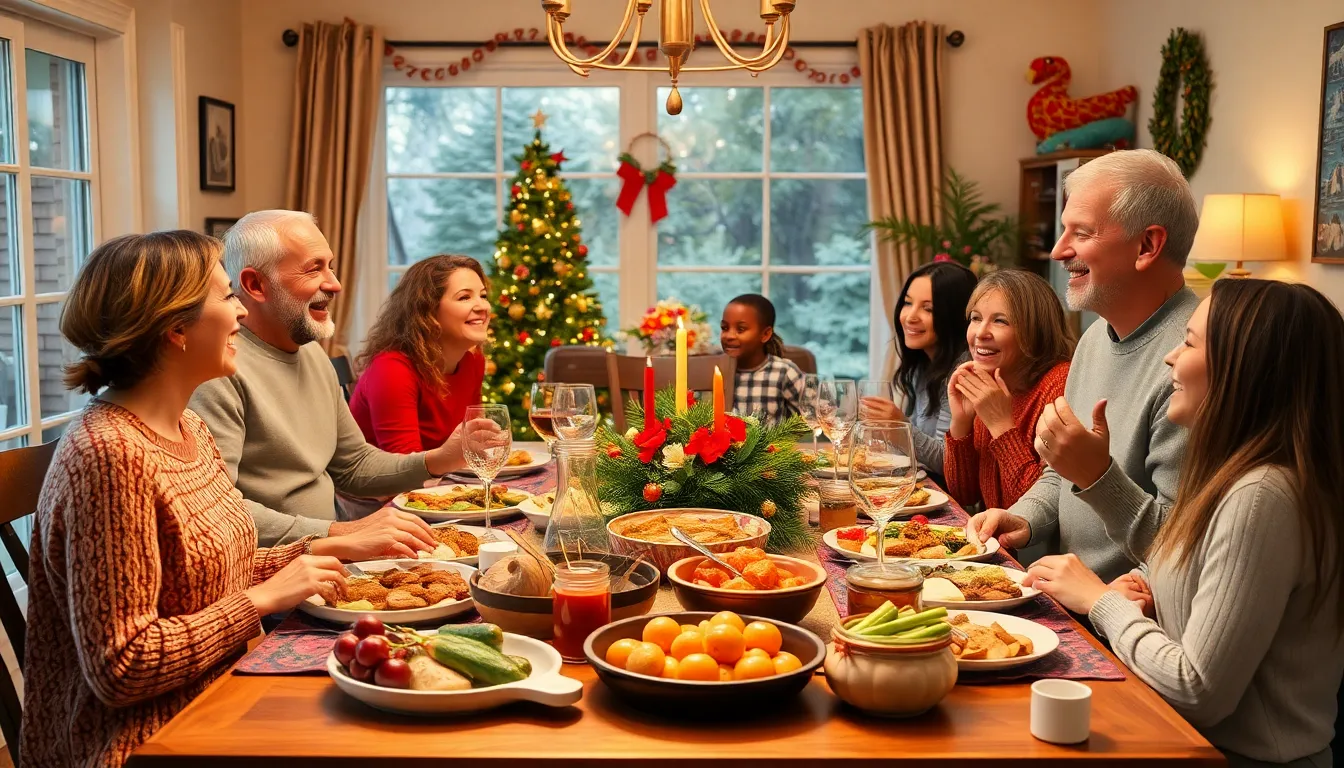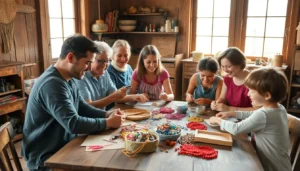Table of Contents
ToggleFamily traditions are like the secret sauce that makes life flavorful and memorable. They’re those quirky rituals that bring everyone together, whether it’s a yearly holiday feast that rivals a food competition or a Saturday night game that turns into a hilarious showdown. These traditions not only create lasting memories but also strengthen bonds and add a sprinkle of joy to everyday life.
Imagine the stories that get passed down through generations, each one more outrageous than the last. From the great pumpkin carving disaster to the epic family dance-offs, these moments become the fabric of family lore. Embracing these traditions can turn an ordinary day into an extraordinary celebration, reminding everyone that family is what truly matters. So, why not dive into the delightful world of family traditions and discover how they can enrich lives and bring a smile to every face?
The Importance of Family Traditions
Family traditions play a crucial role in enhancing the quality of life. They create a sense of togetherness that builds stronger connections among family members.
Building Family Bonds
Family rituals foster unity among relatives. Celebrating holidays together encourages participation and collaboration. Shared activities, like cooking special meals or playing games, open up avenues for communication. These interactions help in understanding each other’s perspectives better. The resulting memories serve as a foundation for deeper relationships. When families dedicate time to traditional practices, they promote trust and support. This atmosphere ensures that each member feels valued and included.
Creating Lasting Memories
Engaging in family traditions leads to unforgettable experiences. Unique celebrations, such as themed parties or yearly vacations, create stories worth sharing. Rituals like storytelling sessions enhance connection through shared narratives. Each memory crafted during these events strengthens family identity. Recalling these moments fosters a sense of nostalgia and belonging. Families can look back fondly on these times, reinforcing their bond. Memories born from these traditions often become cherished parts of family history.
Types of Family Traditions

Family traditions come in various forms, enriching family life through shared experiences. Two prominent types include holiday celebrations and weekly rituals.
Holiday Celebrations
Holiday celebrations form a core aspect of family traditions. Families often gather for events like Thanksgiving, Christmas, and Halloween. Each holiday brings unique customs that foster a sense of belonging. For instance, preparing special meals, exchanging gifts, or decorating homes creates joyful anticipation. Celebrating these occasions strengthens familial bonds. Traditions such as family reunions or festive games offer opportunities for storytelling, connecting generations in meaningful ways.
Weekly Rituals
Weekly rituals provide consistency and unity within families. Activities may include Sunday dinners, game nights, or movie marathons. These rituals encourage regular interaction, promoting communication and understanding. Families often use this time to share updates and strengthen connections. Engaging in collaborative activities such as cooking or playing games cultivates teamwork. Weekly rituals create a comforting routine, helping families navigate life’s challenges together.
The Impact of Family Traditions on Children
Family traditions significantly influence children’s development, shaping their experiences and connections. These rituals help create a sense of belonging and continuity.
Fostering Identity
Family traditions foster children’s identity by providing them with a sense of connection to their heritage. Regular participation in traditional practices, like holiday meals or cultural celebrations, gives children a framework to understand who they are. Through storytelling and shared experiences, they learn about family history and values. Celebrating unique family customs allows children to recognize their role within the family unit. Identifiable rituals create lasting memories that contribute to personal growth and confidence. Observing how family members engage with these traditions further reinforces their understanding of their place in the family’s narrative.
Instilling Values
Family traditions instill core values that guide children’s behaviors and beliefs. Engaging in activities like volunteering during the holidays teaches empathy and generosity. Celebrating achievements together emphasizes the importance of support and teamwork. These practices also highlight the value of communication, as families share their thoughts and feelings during rituals. Respect, responsibility, and love emerge through consistent exposure to family traditions. Children internalize these values, which influence how they interact with peers and the larger community. As they grow, these instilled principles become integral parts of their character and decision-making processes.
How to Start Your Own Family Traditions
Starting family traditions requires thoughtful planning and participation. These rituals can enrich family identity and create memories.
Involving Everyone
Involving all family members is crucial for establishing meaningful traditions. Engage children and adults alike by inviting them to share ideas. Brainstorm activities like movie nights or seasonal outings. Choose options that resonate with different age groups. Participation fosters a sense of ownership, encouraging commitment to the tradition. Rotate responsibility for organizing events to promote collaboration. Encourage everyone to contribute by sharing stories or favorite activities. Focus on inclusivity to strengthen bonds and elevate enjoyment.
Adapting Over Time
Adapting traditions helps them remain relevant as families grow and change. Modify activities based on age, interests, and circumstances. Embrace new experiences that reflect evolving family dynamics. For instance, transitioning from game nights to outdoor adventures can invigorate routines. Celebrate milestones such as graduations or new family members to refresh traditions. Retain core elements for continuity while incorporating novel ideas. Tap into creativity to keep family traditions exciting and engaging. Flexibility ensures that traditions continue to foster connections and celebrate shared values.
Family traditions play a vital role in shaping relationships and creating a sense of belonging. They serve as the backdrop for cherished memories that families carry through generations. By engaging in these rituals families not only strengthen their bonds but also instill important values in children.
As families navigate life’s ups and downs together these traditions provide a comforting routine that fosters unity and collaboration. Embracing and adapting these practices ensures they remain meaningful and relevant. Ultimately family traditions enrich lives and cultivate happiness making them an essential part of any family’s journey.




